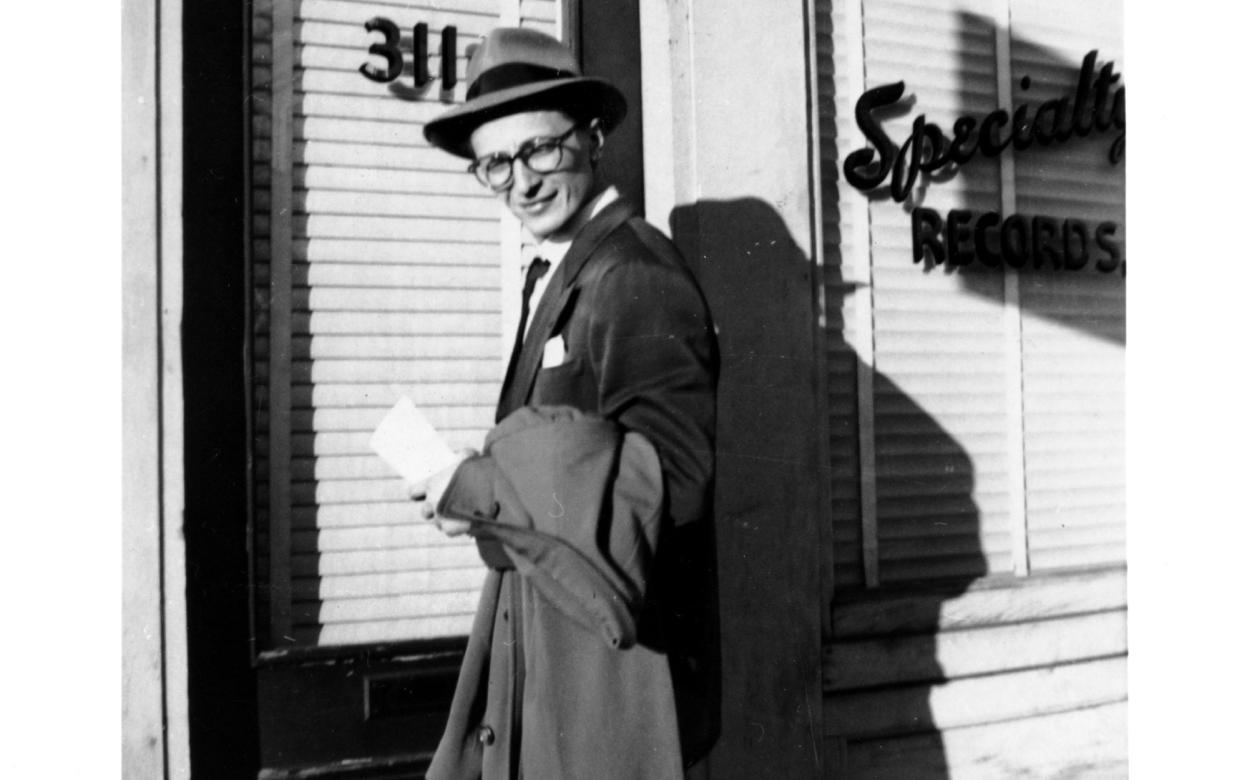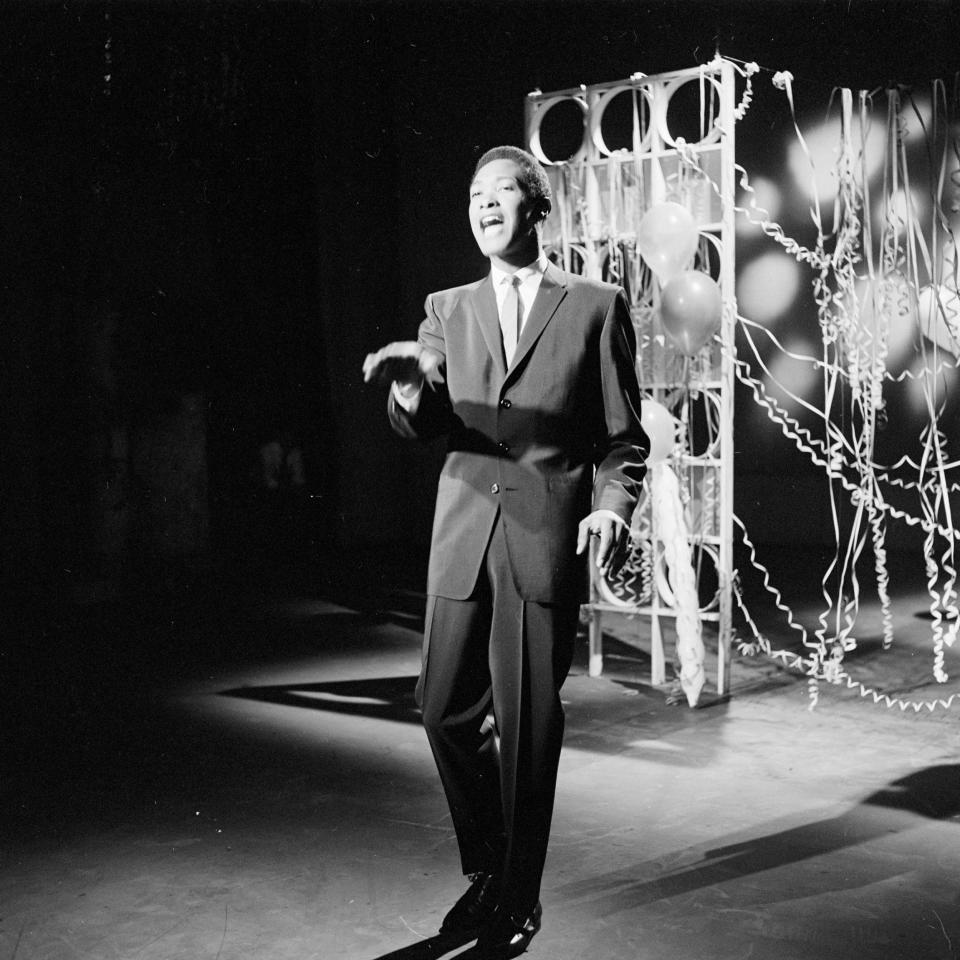Art Rupe, whose Specialty record label made a star of Little Richard and launched the career of Sam Cooke – obituary

Art Rupe, who has died aged 104, was not prone to creating a legend around himself, but he was one of the most influential impresarios in rock’n’roll music.
He looked like a small-time private detective, but he was inspired to found his own Specialty record label on a shoestring, and swiftly discovered such performers as Sam Cooke, Little Richard, Lloyd Price and Art Neville – and owned the label himself for decades after others had been taken by conglomerates.
He was born Arthur Newton Goldberg in Greensburg, near Pittsburgh, Pennsylvania, on September 5 1917, and grew up in the unglamorous working-class, mixed-race McKeesport nearby. His father was a furniture salesman from Galicia in Eastern Europe, while his mother was from Pittsburgh.
He had a love of music from an early age, enjoying big-band music in the park, and at a nearby Baptist church he became enthralled by the gospel music which would later feature on his label. In Pittsburgh he saw Count Basie and Duke Ellington, but his consumption of black music was mostly from records.
After studying in Ohio, he moved to California to study business administration at UCLA, partly to be close to the movie industry, which he had ambitions of entering. It was 1939, and he travelled with some friends in a precarious Pontiac, which got them as far as Missouri, where it broke down. With no money, they resorted to selling their possessions – until a carnival reached town. They joined it, netting funds for the rest of the journey.
Their arrival in LA coincided with the city’s growth spurt, in particular that of its black population, attracted by the amount of work available. Although the more liberal wartime atmosphere would foster what were known as “race” records, few large companies were canny enough to move into this market. This left the way free for small labels, many of them run from their owners’ garages, and more adaptable, with greater potential.
Rupe revised his first thoughts of working in the film industry when he discovered how rife nepotism was. He took a new name, Rupe – an ancestral name from his father’s side of the family – and answered an advertisement for a partner at Atlas Records, only to find that it was so poorly managed that it could not even get hits with Nat “King” Cole and Frankie Laine on its roster.
Its collapse took most of Rupe’s money with it, but he used what was left of his savings to found Juke Box Records in 1944; their first “office” was – literally – a cigar-box on someone else’s desk used as a poste-restante.
Rupe was determined to seek out acts for which there was no place in larger concerns. He discovered a band named the Sepia Tones and, alert to musical tastes, called their debut Boogie #1 – “boogie” being a popular term in R’n’B, he found. Always meticulous, Rupe studied the market, even timing solos on a stopwatch in an attempt to learn what sold and what did not.
Even though shellac was in short supply, he pressed and sold 70,000 copies of Boogie #1 , which yielded enough funds to record other artists, notably Roy Milton and his Solid Senders. By dint of cunning recording techniques Rupe gave this small combo a big-band sound. He had a string of hits with Milton, most notably It’s Later Than You Think.

His true passion was recording itself, but, as Juke Box mutated into Specialty Records (so called because it specialised in black singers), he had to acquire the business skills necessary to get his records distributed and played. He was generous to his musicians, often paying royalties as well as scale.
One great, unexpected hit was the instrumental X-Temporaneous Boogie by Camille Howard, pianist with Roy Milton – so named because she improvised and recorded it with a trio minutes before a musicians’ strike was due to begin.
Rupe branched out into country music, with less success, and kept up his early love of gospel music – his “favourite type of music,” he said, “not for religious reasons but because of the feeling and the soul and the honesty of it.”
Out of the blue, on Specialty’s doorstep, arrived Percy Mayfield (father of Curtis), who had one of the finest post-war blues voices. Bob Dylan was not exaggerating when he called him a poet, and his passion is evident in such songs as Two Years of Torture, Please Send Me Someone to Love and What a Fool I Was.
Rupe went to look for new talent in New Orleans, home of Fats Domino, whose piano-and-sax sound he so much admired. At the last minute, after endless dull acts he saw Lloyd Price, who was so nervous that he sang behind a curtain.

Price had been working on a song that became Lawdy Miss Clawdy, a huge hit in 1952, recorded in New Orleans with Domino on piano. It sold in all markets and can claim to be a pioneer of the rock’n’roll boom. Alas, the Army drafted Price in 1954 and sent him to Korea.
Rupe also had successes in the burgeoning doo-wop market with the Hollywood Flames, a group which, in time, would produce Bob and Earl of Harlem Shuffle fame. There was something of a hiatus before Rupe was able to take advantage of the booming teen market – but when he did it was with the wild sound of Little Richard at the piano, bawling out a thrilling (if lyrically toned down) Tutti Frutti.
Amazingly, earlier labels had not been able to do justice to this unique talent, and Rupe was able to get him for $600. In 18 months, Richard came up with 14 hits, many of them covered by Elvis and Jerry Lee Lewis – as well as the notoriously tame versions by Pat Boone for the white market – and Specialty boomed.
Gallingly for Rupe, Little Richard, who had so swiftly come up with Long Tall Sally, Slippin’ and Slidin’, Rip it Up, Ready Teddy, The Girl Can’t Help It, Lucille and Good Golly Miss Molly, decided to exchange the devil’s music – albeit temporarily – for the ministry. Such was his resolve that on a boat from Australia he hurled his jewellery into the ocean. Rupe, however, was able to turn Lloyd Price’s cousin and valet, Larry Williams, into something of a substitute, with hits such as Short Fat Fannie, Bony Moronie and Dizzy Miss Lizzy.
The growth of the LP market prompted Rupe to experiment with jazz, while the label’s substantial gospel side achieved notable success with the Soul Stirrers. They featured a young singer named Sam Cooke, who soon revealed secular longings.
Rupe once said of Cooke that he “was a very intense guy. He didn’t give an appearance of being nervous, but when you’d talk to him he’d really study you; he’d really look and listen like he was taking impressions with his eyes and with his ears.”
The leader of the Soul Stirrers, however, was fearful that any pop experiments would taint its reputation, and Rupe, preoccupied with his shaky marriage, was none too keen on imitating white music. Accordingly, and to Rupe’s everlasting regret, Cooke took his song You Send Me to another label, the first of numerous worldwide hits.
By the late 1950s Rupe was feeling rueful at the loss of artists to God and other labels, and was vexed by the industry’s underhand methods – especially payola, in which DJs were paid by labels to play their records. He found that other business involvements – oil and real estate – were less troublesome.
Black acts that had been the mainstay of Specialty were now finding themselves eclipsed by the demand for cleanly-dressed white performers whom Rupe had no interest in recording. The biggest of them, The Beatles – who had been deeply inspired by Specialty’s output, and went on to record three Larry Williams numbers – were recommended to him by Little Richard, who phoned him excitedly from their joint tour in Britain, but Rupe failed to follow it up, and in the US they signed instead to Vee-Jay, another largely black label, before EMI’s US affiliate Capitol realised belatedly what they were missing out on and snapped them up.
Rupe spent most of the 1960s failing to break into the film industry, returning to Specialty in 1970 to begin reissuing their back catalogue. He sold up in 1990 and the following year established a charitable foundation. In 2011 he was given the Ahmet Ertegun Award for Lifetime Achievement by the Rock and Roll Hall of Fame.
Art Rupe’s first marriage, to Leona Hanson, produced a daughter but ended in divorce. His second wife, Dorothy, predeceased him and he is survived by his daughter.
Art Rupe, born September 5 1917, died April 15 2022

 Yahoo News
Yahoo News 
